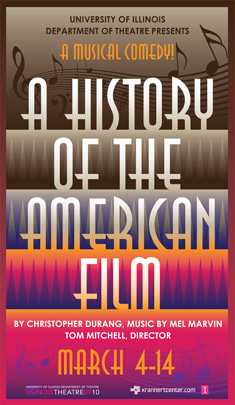 As is often the case, I entered the Krannert Center’s Colwell Playhouse knowing next to nothing about what I was about to see. If I’d read more about this particular play, I’d probably not have attended.
As is often the case, I entered the Krannert Center’s Colwell Playhouse knowing next to nothing about what I was about to see. If I’d read more about this particular play, I’d probably not have attended.
Christopher Durang’s “A History of the American Film” is a parody of the classic 1930s–1940s musicals and films that the WWII Generation enjoyed. Good Girl Loretta falls in love with Jimmy the Gangster, and through their adventures we’re treated to an historical account of the best that American film had to offer during the early 20th century.
I know virtually nothing about American film during the early 20th century, best or otherwise. Sure, I’ve seen Gone With the Wind and Fantasia. I’ve seen Casablanca (was that filmed in the 40s? I think so). I know that there were a lot of films that featured beautiful women performing synchronized swimming (and that this is now an Olympic Sport); I know that there were old, skinny men—wearing top hats and tails—singing and dancing with beautiful, gorgeously dressed women who were also singing and dancing. So I recognized these references. But I’ve never seen a Fred Astaire film, or an Al Jolson film (did he make films?), or Joan Crawford, or Katherine Hepburn, or anything with Judy Garland after The Wizard of Oz (I’m gonna lose my gay card for this; I know it). So, I’m afraid that I probably missed a lot of Durang’s references.
OK, enough about me.
All of that being said, I still enjoyed this play. I recognized many archetypal characters: the bumbling, simplistic upper-class white people and their contented, lovable black maid; the madcap heiress; the wise-cracking, yet ultimately Good-Hearted Girl in love with the Wrong Man; the WWII pinup girls; the long-suffering Mama; the Bad Son and his Good Brother-the-Irish-Cop; and finally, the Good Girl: men wanna marry her, girls wanna be her.
And I caught some of the iconic film motifs: vaudeville; “screw-ball” comedy; Patriotic American Fetishism; and Gangster Jimmy, who couldn’t seem to get through an argument with his girlfriends without shoving a grapefruit into their faces (James Cagney reference?).
The actors’ performances were impressive. With a cast this talented, I couldn’t help but enjoy myself. And there was one musical number that alone was worth the price of admission. In an absolutely filthy send up to the Ziegfeld Follies, a song that praised the virtues of the tossed salad was performed. At least I think it was filthy; I know my mind went there. And I wasn’t the only one in the audience whose mind clearly went there, so if it was an innocent number, I don’t want to know because that would just ruin things.
Future “History of the American Film” performances:
- Thursday–Saturday, March 11–13, 7:30pm
- Sunday, March 14, 2010, 3pm








